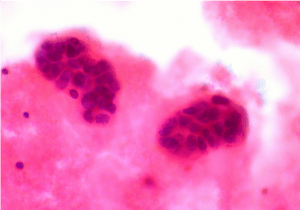Anahita Kodali 23′

Figure 1: This is an image of metastatic breast cancer that was found in the pleural fluid, the excess fluid found between layers of pleura on the outside of the lungs. About 30% of women diagnosed with breast-cancer will have the cancer metastasize to other parts of the body [5] (Image Source: Wikimedia Commons)
Now, however, there is new hope for metastatic cancer patients. TYME Technologies Inc. recently created an experimental treatment called SM-88. SM-88 is a collection of molecules whose main goal is to stop protein production inside of cancer cells. The drug contains a modified version of tyrosine, an amino acid that cancer cells consume to meet their high energy demands. The modified tyrosine gets taken up by cancer cells, where it interrupts the protein-manufacturing process because cancer cells are not capable of creating proteins from the amino acids carrying the tyrosine modification. This has many negative effects on the cells’ protein production, but one of the most significant impacts is that the cells cannot create proteins called mucins, which cancer cells use to protect themselves from immune attack. Cell toxicity caused by the modified tyrosine and immune cell attack result in cancer cell death [2].
SM-88 has proven itself to be a powerful and effective treatment method over the course of several different clinical trials involving patients with several different types of metastatic cancers. Patients with metastatic breast, prostate, and lung cancer have shown incredible results. TYME is now pivoting towards treating pancreatic cancer, a relatively rare but deadly form of cancer with very few treatment options [3]. Pancreatic cancer is especially problematic for doctors because it is often diagnosed late and has a very high rate of metastasis; 5-year survival rates for pancreatic cancer patients are only about 8.5% [4]. In initial trials with SM-88, however, patients showed promising tumor shrinkage and an average increase in life expectancy. TYME launched a clinical trial in late 2019 to more fully explore SM-88 as a treatment option for pancreatic cancer [3]. In the coming years, the hope is that the drug will become a common treatment option and improve patient outcomes for all forms of metastatic cancer.
References:
[1] NCI Staff. (2017, September 20). Overcoming the Challenges of Metastatic Cancer. NIH National Cancer Institute. Retrieved from https://www.cancer.gov/news-events/cancer-currents-blog/2017/metastatic-cancer-kaplan
[2] (n.d.). A Trickster Enters the Fight Against Metastatic Cancers. Scientific American Retrieved from https://www.scientificamerican.com/custom-media/a-trickster-enters-the-fight-against-metastatic-cancers/?mvt=i&mvn=5f65a57f546f4dcca5ab47f6dfda6a55&mvp=NA-SCIEAMERLIVE-11237933&mvl=HomeAgenda
[3] (n.d.). Scientific Presentations. TYME. Retrieved from https://www.tymeinc.com/data-publications/scientific-presentations/default.aspx
[4] (2019, March 7). Why Is Pancreatic Cancer So Deadly? University of Utah. Retrieved from https://healthcare.utah.edu/healthfeed/postings/2019/03/pancreatic-cancer.php
[5] (2020, January 22). Metastatic Breast Cancer: Symptoms, Treatment, and More. BreastCancer.org. Retrieved from https://www.breastcancer.org/symptoms/types/recur_metast